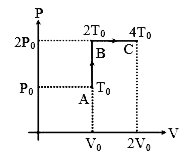A diatomic ideal gas is heated at constant at constant volume until the pressure is doubled and again heated of constant pressure until the volume is doubled. The average molar heat capacity for the whole process is
A
13R6
B
19R6
C
23R6
D
17R6
Video Solution
Text Solution
The correct Answer is:B
Let initial pressure, volume, temperature be P0,V0,T0 indicated by state A in P-V diagram. The gas is then isochorically taken to state B(2P0,V0,2T0) and then taken from state B to state C(2P0,2V0,4T0) isobarically.

Total heat absorbed 1 mole of gas
ΔQ=CV(2P0−T0)+CP(4T0−2T0)
=52RT0+72R×2T0=192RT0
Total change in temperature from state A to C is
ΔT=3T0
molar heat capacity =ΔQΔT=192RT03T0=196R.
|
Similar Questions
Knowledge Check
A diatomic ideal gas is heated at constant volume until the pressure is doubled and again heated at constant pressure until volume is doubled. The average molar heat capacity for whole process is -
A13R6B19R6C23R6D17R6A monatomic ideal gas is heated at constant volume until its pressure is doubled. It is again heated at constant pressure, until its volume is doubled. Find molar specific heat for the whole process.
A3R2B5R2C13R6D7R2If an ideal gas is heated at constant pressure :
Athe volume increasesBthe mass of gas remains sameCthe kinetic energy of the molecules increasesDattraction forces between gas particles increases
When a gas is heated in a vessel of constant volume , the pressure increases because
View SolutionAn ideal gas is heated at constant volume until its pressure doubles. Which one of the following statements is correct?
View SolutionMolar heat capacity at constant volume can be given as
View SolutionMolar heat capacity at constant volume can be given a
View SolutionFor an ideal gas, the heat of reaction at constant pressure and constant volume are related as
View Solution
